All of these ancient stories have a battle between Good and Evil, between the righteous and the unrighteous—an obvious popular theme in the ancient world.
1. The Story of Appu is a mythological Hittite text (c. 1610- c.1180). The text is fragmentary, and the sequence of events in the story is a reconstruction. The geographical setting for the Hittites is in Mesopotamia in c. 1300 BC.
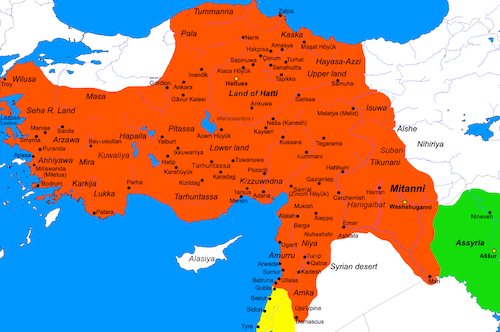

“The reconstructed argument of the text is as follows: Appu is a rich man, but he is unhappy because he has no son. The text hints at the possibility that Appu doesn’t know anything about sex. He sacrifices a lamb to ask the help of the gods. The sun-god appears and advises him to get drunk and then have sex with his wife. Eventually, Appu’s wife gives birth to a first son, named Idalu (mḪUL-lu) “bad, evil”. At this point the text alludes to a rite of name-giving, paralleled in the Song of Ullikummi, where the newborn is set on the knee of the father.
Appu’s wife later gives birth to a second son, named Ḫandanza (mNÍG.SI.SÁ-an) “good, righteous”. When both sons have reached adult age, Idalu suggests that they divide the paternal estate among them. He argues that, as each of the gods has his own city, so should they also each have their own property. Idalu tricks his brother, taking most of the estate and leaving him only with a barren cow. But the sun-god blesses the cow and restores her fertility. At this point the first tablet ends and the rest of the story is very fragmentary.
It appears to deal with litigation between the brothers; Idalu seems to take Handanza to court before the sun-god at Sippar. When the god rules in favour of Handanza, Idalu curses, and the sun-god refuses to conclude the case, sending the brothers to Ishtar at Nineveh to conclude the case.”
Ishtar for thousands of BC years was the most famous of the Mesopotamian goddesses/gods. The above is a tale of JUSTICE delayed.

2. The Eloquent Peasant (Ancient Egyptian: Sekhti-nefer-medu, meaning “a peasant good of speech”) is an Ancient Egyptian story that was composed around 1850 BC during the time of the Middle Kingdom in Egypt. It is one of the longest Egyptian tales that has survived completed. The tale is about a peasant, Khun-Anup, who stumbles upon the property of the high steward, the noble Rensi son of Meru, guarded by its harsh overseer, Nemtynakht. It is set in the Ninth or Tenth Dynasty around Herakleopolis. This is a story of the triumph of JUSTICE.

“The story begins with a poor peasant, Khun-Anup, traveling to market with his donkeys heavily laden with goods to exchange for supplies for his family. While Khun-Anup was en route, Nemtynakht, a vassal of the high steward Rensi, notices the peasant approaching his lands and devises a scheme to steal Khun-Anup’s donkeys and supplies. Nemtynakht tricks the peasant by placing a cloth on the narrow public path, where one side was bordered by the river and the other side were the private fields of Nemtynakht. His placing of the cloth on the path forces the peasant to either trample the cloth, step into the water, or take his donkeys over Nemtynakht’s fields in order to continue his journey. As Khun-Anup is appealing to Nemtynakht’s sense of reason in blocking his path with the cloth, one of Khun-Anup’s donkeys eats a bite of barley, and Nemtynakht uses this as a justification to take Khun-Anup’s donkeys and goods. When Khun-Anup complains this punishment is unfair, Nemtynakht beats him. Khun-Anup cries out for justice, and Nemtynakht threatens the peasant with death if he dares to complain. Khun-Anup does not accept this injustice and continues to appeal to Nemtynakht for ten days.
Failing to receive justice from Nemtynakht, Khun-Anup seeks out the high steward, the noble Rensi son of Meru, and presents his case. Rensi brings the peasant’s case to the magistrates, who dismiss the case as merely being a matter of a peasant at odds with a landowner, but Rensi does not relay this information to the peasant.
Rensi brings the story of the wronged peasant before the pharaoh, Nebkaure (who is believed to be (Nebkaure Khety) telling him how elegantly the peasant speaks. Intrigued by the report of a peasant who speaks so elegantly, the pharaoh instructs Rensi to not respond to the peasant’s pleas, so that the peasant would continue to make his elegant speeches and they could be written down for the pharaoh. The pharaoh orders Rensi to feed the peasant and his family while the peasant continues to plead his case, further instructing Rensi not to let the peasant know he was providing the food.
For nine days Khun-Anup complimented the high steward Rensi and begged for justice. After nine days of speeches, Khun-Anup threatened suicide. After sensing that he was being ignored, Khun-Anup insulted Rensi and was punished with a beating. After one last speech, the discouraged peasant left, but Rensi sent for him and ordered him to return. But rather than being punished for his insolence, the peasant was given justice. Rensi, after reading Khun-Anup’s last speech, was impressed and ordered the donkeys and the goods to be returned to Khun-Anup and the peasant to be compensated with all the property of Nemtynakht, making Nemtynakht as poor as Khun-Anup had been.”
3. The Myth of Adapa is Mesopotamian story from 14th century BC. “The earliest record of myth of Adapa is from the 14th century BC. Adapa was a Sumerian citizen who was blessed by the god Enki (god of water., knowledge, mischief, etc.) with immeasurable intelligence.
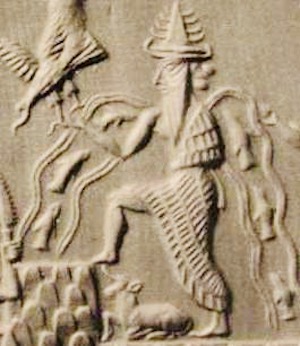
However, one day Adapa was knocked into the sea by the south wind, and in a rage he broke the south wind’s wings so that it could no longer blow. Adapa was summoned to be judged by An (god of the skies), and before he left Enki warned him not to eat or drink anything offered to him. However, An had a change of heart when he realized just how smart Adapa was, and offered him the food of immortality, which Adapa, dutiful to Enki, turned down.”
This story is used as an explanation for humankind’s death. it is associated with “the fall of man narrative” that is also present in the first book of the Old Testament: Genesis 3:1-24
Notice it was the Tree of KNOWLEDGE of Good and Evil which was prohibited.
4. Old Norse Story/Myth. By the 12th century AD Christianity and its Bible were firmly established in the Norse culture. However, the stories and tales of its ancient idols continued to be orally told. This is one of those tales. Seems like so many ancient tales like this one is a unique look at “the fall of man into aging, mortality, death” as is the very, very ancient Garden of Eden story. Notice here how APPLES are seen in the fall of man. Some Christians throughout the centuries have asserted that APPLES were the fruit which Eve offered to Adam to tempt him to disobey God. We call the larynx in a man’s throat “an Adam’s apple” because the apple lodged in his throat and he could not swallow it.
The Bible DOES NOT SAY WHAT FRUIT WAS FORBIDDEN. But OBEDIENCE was what God wanted—and did not get.
The Lord God took the man and put him in the Garden of Eden to work it and take care of it. And the Lord God commanded the man, “You are free to eat from any tree in the garden; but you must not eat from the tree of the knowledge of good and evil, for when you eat from it you will certainly die.” Genesis 2:15-17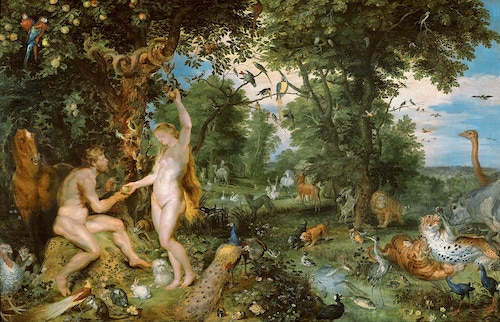 Now begins the narrative:
Now begins the narrative:
“Anyone lucky enough to go to Asgard (heaven) where the Norse gods live, would see at once that all of them, with the exception of Odin, are young, beautiful and handsome. Odin is the exception as he does have such a long beard, and he would look much younger if he shaved it off. But no-one shaves in Asgard, and now I am thinking about it, this may be because the other male gods look too young to grow a beard… How do they manage this? You might well ask, given that they’ve been up in Asgard for quite a while.
The answer lies in Idun, and her Golden Apples.
One day Odin and Loki left Asgard (heaven) to see what was going on in Midgard, the Land of Men. You may know that Odin is the father of the Norse gods, Loki is the god of fire and mischief. Anyway, these two gods had been trekking all day in the mountains, and come nightfall, they were definitely hungry. They saw some cows grazing, and they decided to kill one and have a few steaks. Odin jointed the beef, while Loki got the fire going. This was the work of a moment for him as he was the god of fire, even though the wood was wet, it would have taken you or me a lot longer.
Soon the meat was cooking over the fire. But there was a problem: the fire was hot, the meat was there – but for some reason, it would not cook. Try as they would their dinner remained raw.
“Hmph,” said Odin. “There’s trouble about.”
In the light of the fire, they saw a shadow of a huge bird. They looked up and saw an eagle perched on a branch, silhouetted against the night sky. “That’s no eagle,” said Odin. The bird laughed, “No, I am no eagle and your meat will not cook unless you agree to give me whatever I want.” The gods were tired, cold and hungry so they agreed without inquiring as to the demands of the strange creature.
At once the meat began to sizzle. How good it smelled! But just as they were about to help themselves, the creature in the shape of an eagle, swooped down and grabbed the best bit with his beak. He gulped it down – no chewing for him – and took another piece. “No, you don’t,” said Loki, and he shoved a great log at the bird, trying to beat him off.
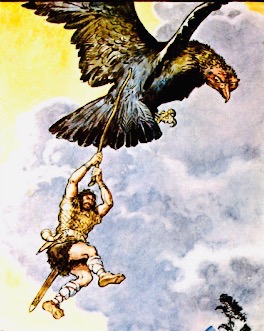 But instead, the eagle grabbed the log and Loki found himself stuck fast on the other end of it. He could not let go! Now the eagle flew low, so that Loki was dragged behind and terribly bashed and bounced about by rocks and branches as they flew over the ground. At last the eagle put him down. “I am the Giant Thjasse,” he said, “and you’re not the only one who can change shape. You will never be free unless you agree to get me Idun’s golden apples. Do you?”
But instead, the eagle grabbed the log and Loki found himself stuck fast on the other end of it. He could not let go! Now the eagle flew low, so that Loki was dragged behind and terribly bashed and bounced about by rocks and branches as they flew over the ground. At last the eagle put him down. “I am the Giant Thjasse,” he said, “and you’re not the only one who can change shape. You will never be free unless you agree to get me Idun’s golden apples. Do you?”
Loki hesitated. Thjasse wasn’t really asking for apples, he was asking for what Asgard prized above all – eternal youth and beauty.
What would his punishment be if he stole that? But he was tired of being bruised and dragged about, so he agreed. Thjasse flew off screeching, “Keep your word or you’ll have me to deal with!” and Loki, who didn’t want that, brushed himself down thoughtfully. Then he rejoined Odin who was already tucking into him steak, and began to eat himself.
This expedition to Midgard had not been very successful and soon the two gods returned to Asgard. Loki did intend to keep his word, and he began by making friends with Idun, keeper of the Golden Apples. This wasn’t hard, as Idun was as sweet and good-natured as her lovely apples! Loki made a good start by telling her about his travels: he had plenty of funny and interesting tales to tell. Every time he went to get his own apple – for all the gods ate them once a week – he took the chance to tell Idun something or make her laugh. One day, he said, ”You know, Idun, these are wonderful apples, but they’re second best. I have seen better.”
“I don’t believe you.”
“You don’t believe me? Come and see for yourself.”
“I think I will,” said Idun.
“Why don’t you bring your own apples?” said the crafty Loki. “Then you could really compare them.”Idun went to fetch her wondrous apples. She kept them in the sort of basket they deserved: it was made of purest gold, just the right size, and the handle was studded with rubies. It was so pretty!
Loki and Idun made for the gates of Asgard. Loki looked up. He saw a huge shadow in the sky – he knew what that meant. All of a sudden, Idun shivered. “I’m not sure I want to go,” she said. “I’ll come another day.”
“A walk outside will do you good,” said Loki, and he took her by the arm and they went through the gate.I dun screamed, and no wonder. The eagle, Thjasse, swooped down for his prize, Idun and her apples. Poor Idun was flying through the air, with Thjasse’s huge claws closed tightly around her waist without scratching her. “Careful with those apples,” he screeched, and poor Idun screamed again. She was fated to be held prisoner in Thjasse’s cold and gloomy castle.
Meanwhile, at first no one in Asgard noticed she had gone. Then things changed: The goddesses complained to each other of one or two grey hairs. Odin, who must have been the oldest if he was the father of the gods, got backache. And one or two little wrinkles, crow’s feet, smile lines – that sort of thing, began to appear on the faces of the gods. They were not happy about it: if they were gods, they had to be immortal. Besides who doesn’t want to look young and beautiful?
They held an assembly of the gods. The number one suspect in the Case of the Missing Apples was Loki, for suspicion always falls on him when there is mischief afoot. It was an uproarious meeting with all the gods demanding that Loki tell the truth, and all sorts of threats and divine curses were banded about.
“Alright, alright. I did it,” Loki, finally admitted. “I was forced into it.”
Then Thor, the strongest of the gods, seized hold of Loki and shook him terribly so that he was in fear for his life.
“Stop, stop,” cried Loki, “I’ll get the apples back. If you kill me, you will never eat those apples again, and you can all suffer the aches and pains of old age.”
When things had calmed down, the gods helped Loki turn into the shape of a falcon.
He flew and flew until he reached Thjasse’s castle. Idun was walking on the ramparts, with her jeweled basket. Quickly, Loki turned her into a nut, clutched it tight with his claws, and soared high towards Asgard. It was lucky he had a good start, for soon Thjasse came home. How he roared when he saw that Idun and her apples were gone! He guessed what had happened, changed at once into an eagle, and flew off, spurred on by anger and fury. Loki flew as quickly as he could, and falcons fly very fast, but it is the eagle that rules the skies, and little by little Thjasse gained on him.
Everyone in Asgard was watching, fearfully. Would Loki get back in time? The gods rushed off and laid great fires on the walls. Near fainting with exhaustion, the falcon flew over the wall and fell to the ground exhausted. In an instant the flames leapt into the sky, and Thjasse was burned. He fell, and died. Idun and her golden apples were safely back home. Youth and beauty returned to Asgard forevermore.”
This is “a desire to return to Eden” story.
“So he drove out the man; and he placed at the east of the garden of Eden Cherubims, and a flaming sword which turned every way, to keep the way of the tree of life.” Genesis 3:24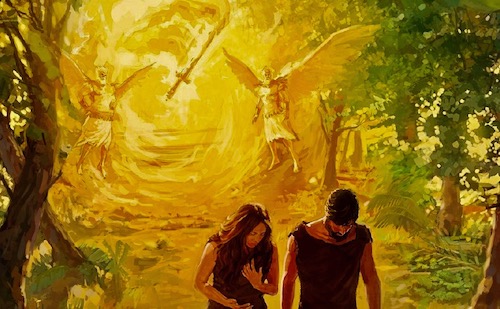
IN TIME MAN AND WOMAN COULD BE REDEEMED BY THEIR REDEEMER.—Sandra Sweeny Silver
